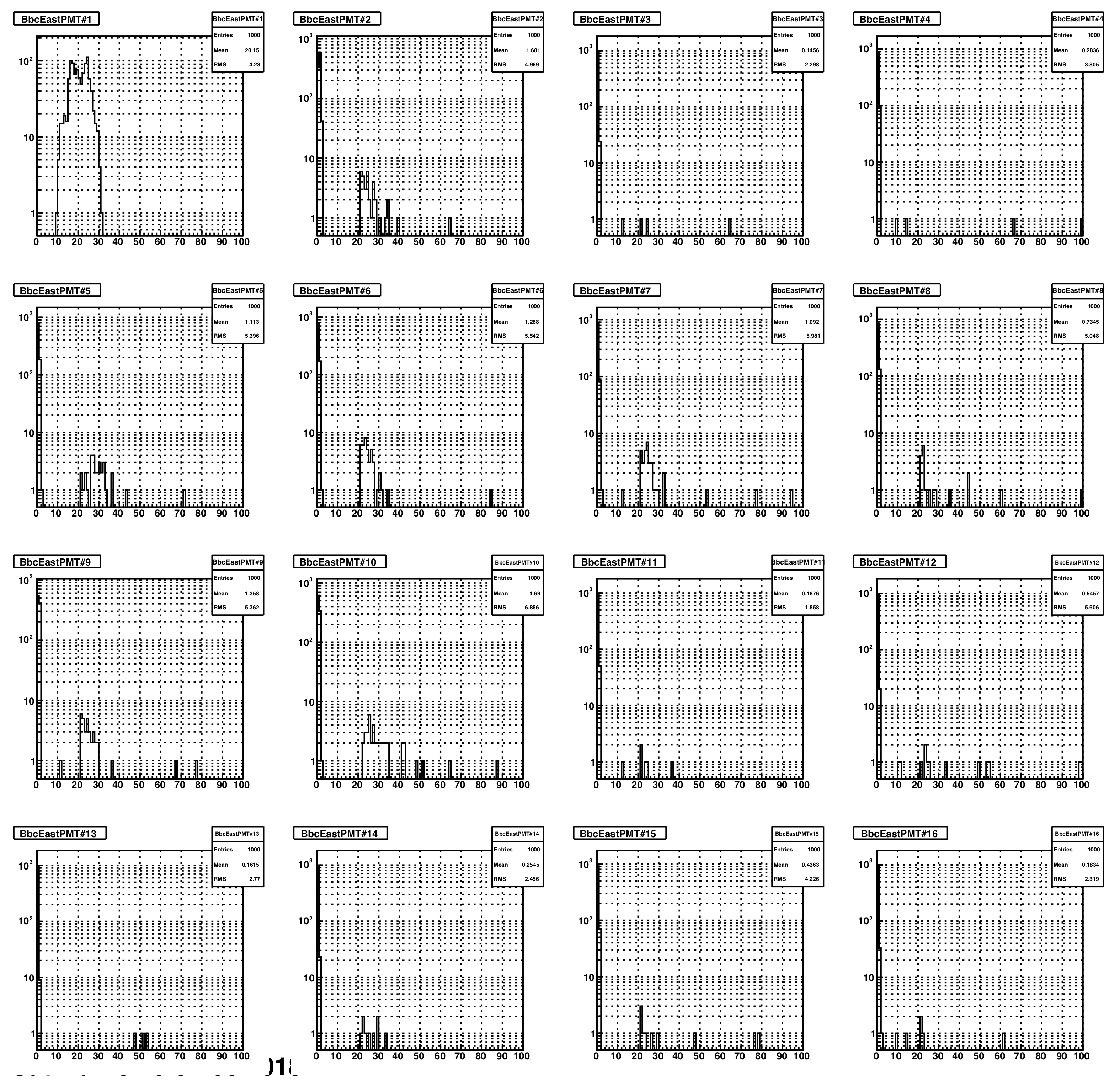Further study of BBC-EPD correlations in pre-2018 run cosmics
Updated on Mon, 2018-03-05 10:57. Originally created by lisa on 2018-03-03 17:44.
Go here for the first of the BBC-EPD correlation studies: drupal.star.bnl.gov/STAR/blog/lisa/bbc-epd-correlations-or-lack-thereof-pre-beam-cosmic-running
Now that the EPD is finally in the official muDst and BFC, anyone who makes muDst files can now analyze EPD and BBC data. Thanks to Rosi for producing several files.
I am looking at MuDst files for runs > 19062000 in /star/data05/scratch/rjreed/
This blog updated twice, on 4 March and 5 March. Scroll down
First look - just 1000 events.
What we see:
There seem to be two EPD tiles on the West side that fire nearly all the time:
.png)
The number of EPD tiles above ADC=5 in the East (negative numbers) and West (positive numbers) when the East (top) and West (bottom) BBC fire.
Clearly, two EPD tiles are "firing" all the time. From the following two plots, we see they are West PP01TT06 and West PP06TT27:

EPD "hit positions" (a random point on a tile) when the East BBC fires.

EPD "hit positions" (a random point on a tile) when the West BBC fires.
We also see that just one or two of the BBC phototubes are responsible for most of the triggers. In particular, PMT #1 on East side is "hot." It never has pedestal.

ADC spectra from phototubes for East BBC Inner tiles

ADC spectra from phototubes for West BBC Inner tiles
Next,100k (now 132k) cosmic triggers
Here, we look at which EPD tiles were "hit" (ADC>10), corresponding to a BBC tile being "hit" (>20). What we see:
Download the pdf file here and flip through it. drupal.star.bnl.gov/STAR/system/files/EpdBbcCorr_0.pdf
Update 5 March 2018
Jack removed a pulser from the BBC PMT #1 East, and we have taken twice as much data (220K events) in this stream.
Download and flip through this pdf file: drupal.star.bnl.gov/STAR/system/files/EpdBbcCorr.pdf
The correlation is more clear with the increased statistics.
Now that the EPD is finally in the official muDst and BFC, anyone who makes muDst files can now analyze EPD and BBC data. Thanks to Rosi for producing several files.
I am looking at MuDst files for runs > 19062000 in /star/data05/scratch/rjreed/
This blog updated twice, on 4 March and 5 March. Scroll down
First look - just 1000 events.
What we see:
- one BBC PMT (East #1) is hot.
- However, something strange: BBC East #1 is never the only tube firing. If it were "hot" and in the trigger, one would expect some events would be triggered just by this one tube. Was East #1 not in the trigger??
- Update 4 March 2018: At the 10:00 meeting, Jack mentioned that there was a pulser plugged into this channel. So that explains it. He removed it today after the meeting.
- two EPD tiles (West PP01TT06 and West PP06TT27) are hot. ADC>9 always.
- Update 4 March 2018: No explanation for this, but I today I have taken PedAsPhys files in the Seven-Pattern mapping test, and these tiles look fine. So perhaps it was a bad pedestal, or maybe a pulser was plugged into there also, or whatever.
There seem to be two EPD tiles on the West side that fire nearly all the time:
.png)
The number of EPD tiles above ADC=5 in the East (negative numbers) and West (positive numbers) when the East (top) and West (bottom) BBC fire.
Clearly, two EPD tiles are "firing" all the time. From the following two plots, we see they are West PP01TT06 and West PP06TT27:

EPD "hit positions" (a random point on a tile) when the East BBC fires.

EPD "hit positions" (a random point on a tile) when the West BBC fires.
We also see that just one or two of the BBC phototubes are responsible for most of the triggers. In particular, PMT #1 on East side is "hot." It never has pedestal.

ADC spectra from phototubes for East BBC Inner tiles

ADC spectra from phototubes for West BBC Inner tiles
Next,
Here, we look at which EPD tiles were "hit" (ADC>10), corresponding to a BBC tile being "hit" (>20). What we see:
- BBC East PMT#1 is just firing free. No correlation. Expected from what we saw above.
- EPD West PP01TT06 and PP06TT27 are firing all the time. No correlation. Expected from what we saw above.
- When the EPD East has a hit, it almost always comes with a hit on East BBC. Similarly for West.
- There is a spatial correlation between the struck BBC tile and the struck EPD tile (flip through the pdf), but less than I would expect/hope.
Download the pdf file here and flip through it. drupal.star.bnl.gov/STAR/system/files/EpdBbcCorr_0.pdf
- The above file has been slightly updated since its first posting. A few more events; This was all that Rosi had processed.
- I recommend downloading it and then flipping page-by-page, rather than scrolling through it on a browser. It makes the spatial correlation more clear.
Update 5 March 2018
Jack removed a pulser from the BBC PMT #1 East, and we have taken twice as much data (220K events) in this stream.
Download and flip through this pdf file: drupal.star.bnl.gov/STAR/system/files/EpdBbcCorr.pdf
The correlation is more clear with the increased statistics.
»
- lisa's blog
- Login or register to post comments
